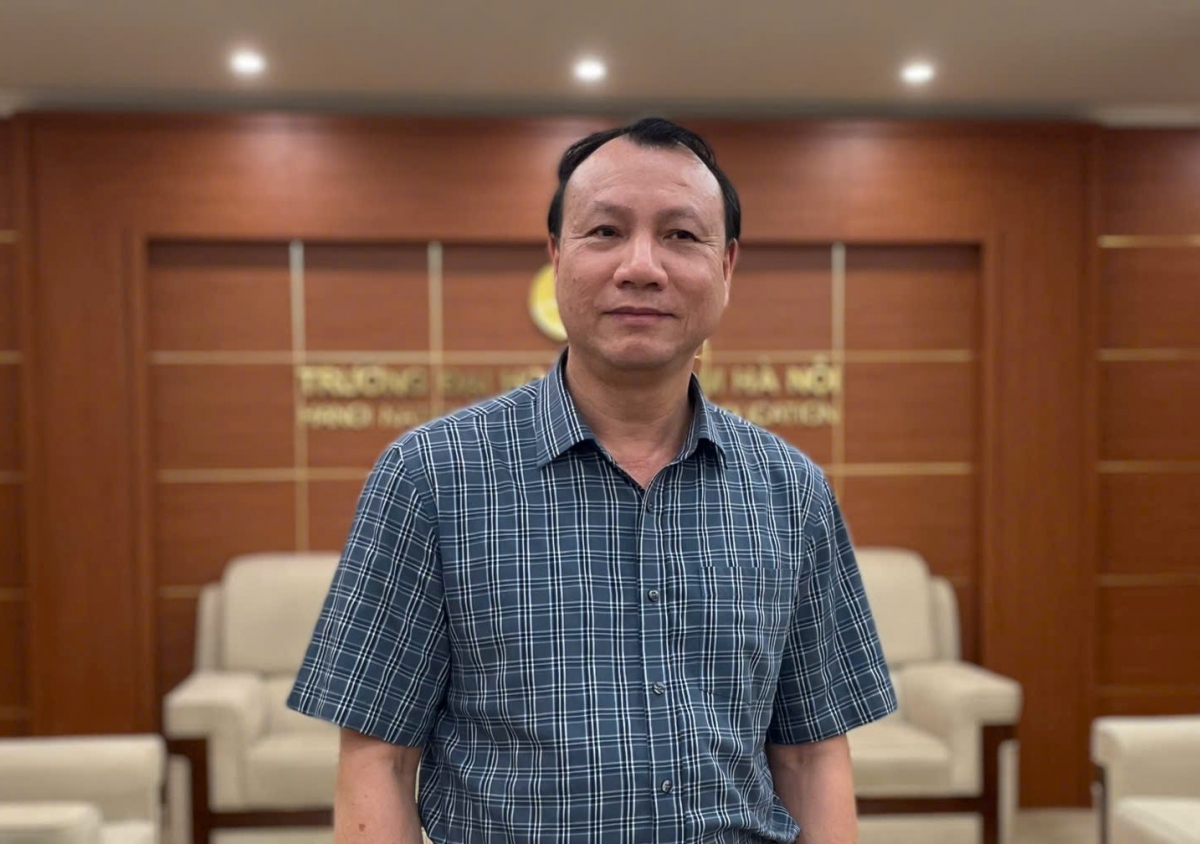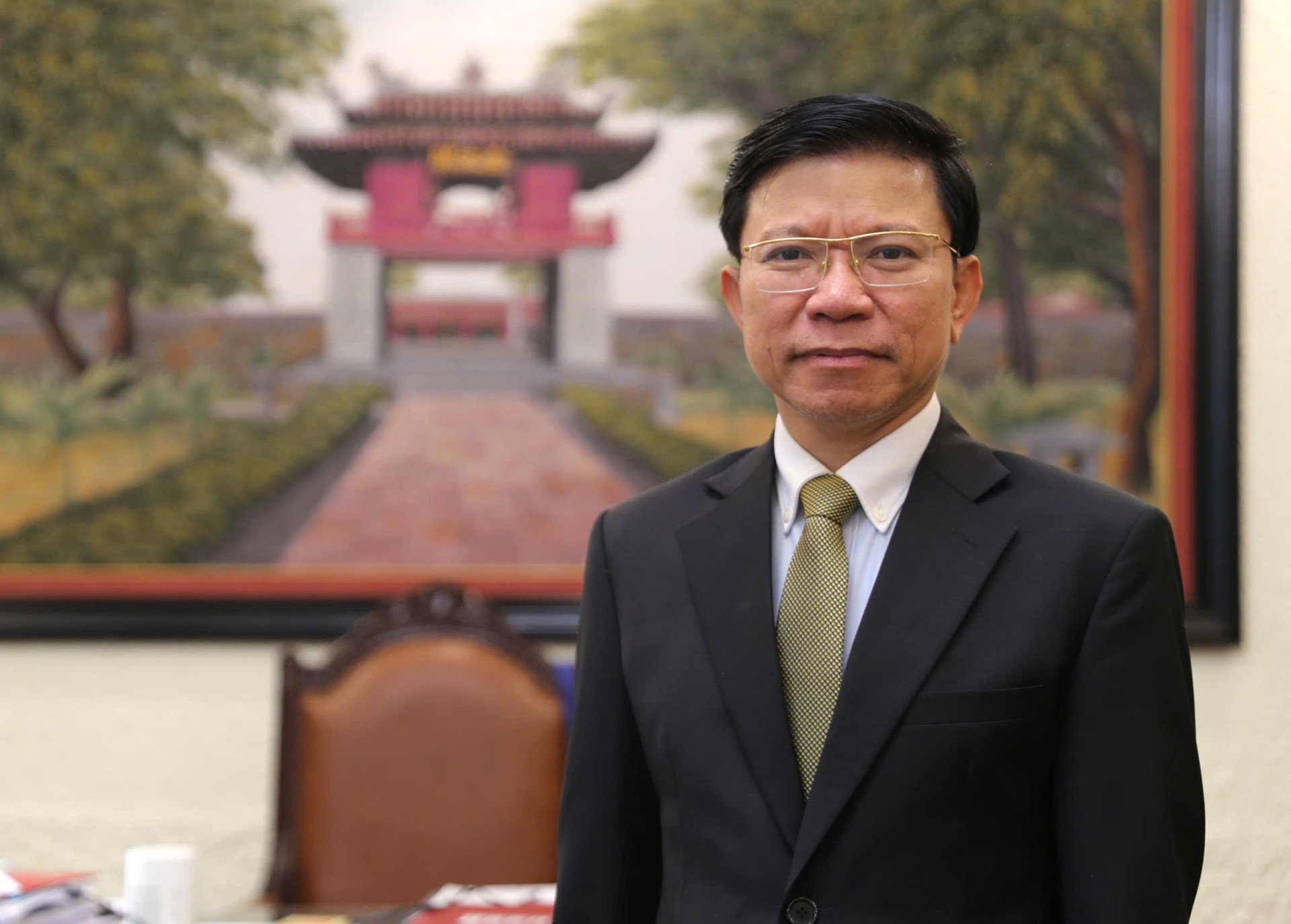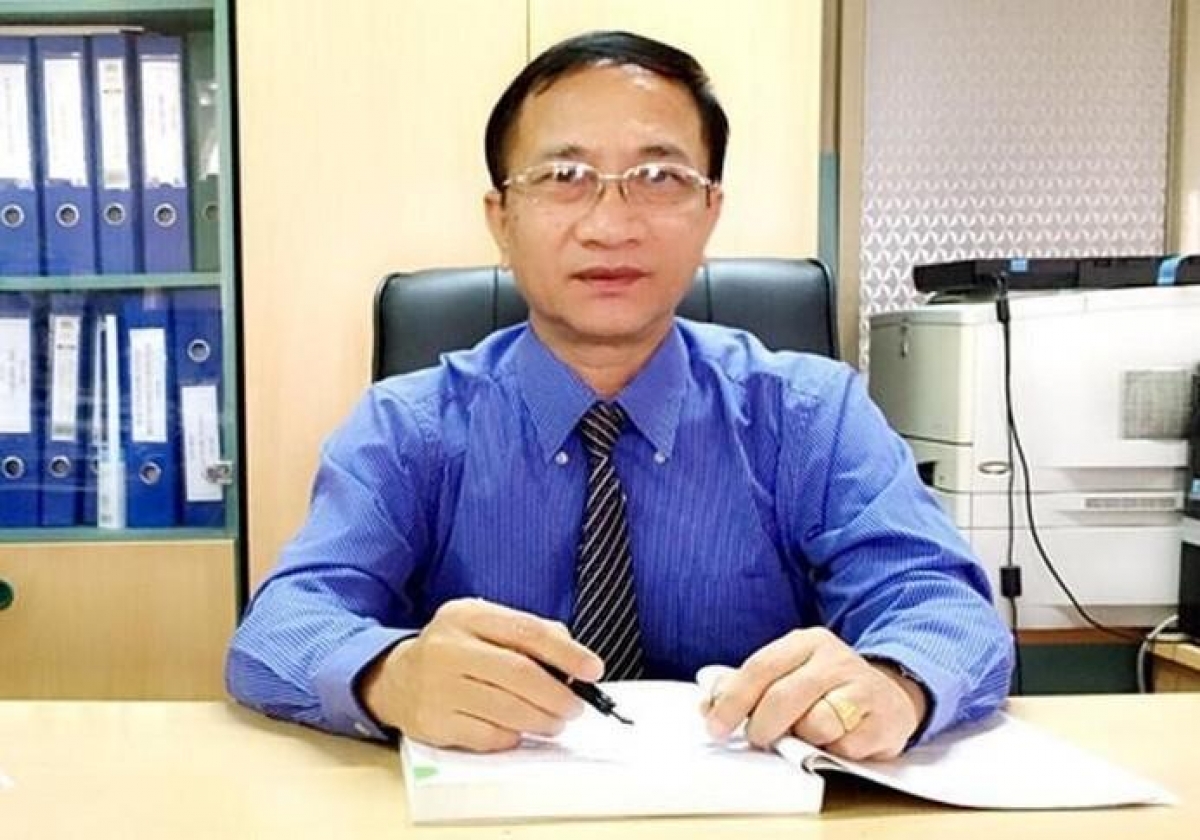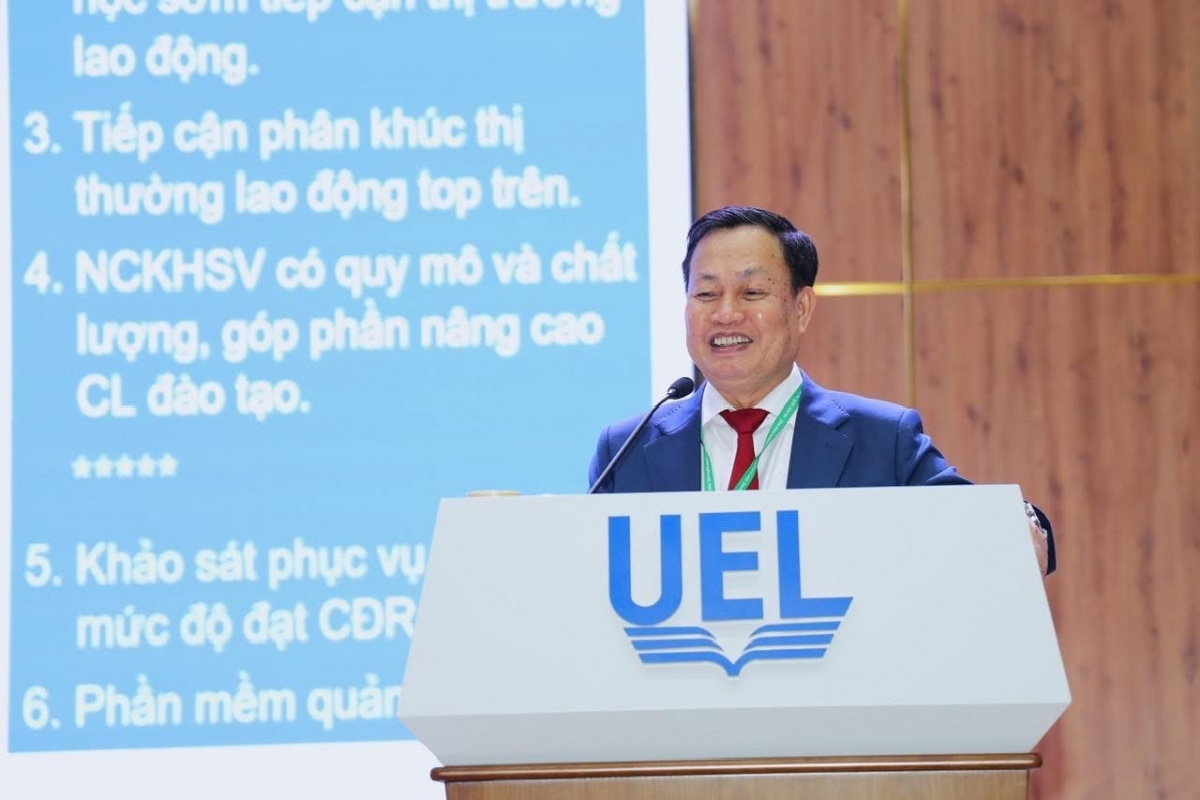Reorganizing the university network is an opportunity for development.According to Professor Chu Duc Trinh, Rector of the University of Technology, Vietnam National University, Hanoi: In recent times, we have aggressively exploited our geographical advantages, signed cooperation agreements with international partners, and especially fully utilized the strength of the Vietnamese people. However, upon reflection, we still rely on cheap labor and simple jobs at the assembly and processing level.
Therefore, in the coming period, with the goal of achieving a breakthrough, we must increase the average labor productivity of Vietnamese people and boost the country's GDP. Professor Chu Duc Trinh believes that education and training, especially higher education, play a crucial role in determining the success of this goal.
According to Professor Chu Duc Trinh, while we have invested heavily in higher education, from the perspective of actual needs, the Vietnamese higher education system is not yet up to par. In the current public university system, investment in infrastructure is weak and insufficient; "schools are not up to the standards we aspire to, and classes are not up to the standards we expect."
Given our country's current economic potential, it is certainly necessary to restructure the university system, focusing investment and development on a few key areas. Particular attention should be paid to two major points: Firstly, training programs must meet the required skills and knowledge standards for each different level, aligned with the mission of each university. Secondly, higher education must link its training mission with scientific research, thereby creating an environment, capabilities, and skills for lifelong learning among students and workers.
According to Professor Chu Duc Trinh, in the coming time, it is necessary to drastically change the university system, focusing on building high-quality higher education institutions that can rival universities in the region and the world.
Professor Chu Duc Trinh, Rector of the University of Technology, Vietnam National University, Hanoi (Photo: Provided by the interviewee)
Resolution 71 sets the goal that in the near future, some Vietnamese universities should be ranked among the top 100 in the world. According to Professor Chu Duc Trinh: if we act decisively this time, our country will have Vietnamese universities that reach the top 50, even 20 in the world. When we invest strategically, we can completely have leading higher education institutions, and these excellent institutions will lead the development of science and technology in the country.
Professor Chu Duc Trinh assessed that implementing the requirement to reorganize the higher education network will certainly affect universities nationwide, but we must see this as an opportunity for development.
Regarding the implementation of Resolution No. 71 of the Politburo on breakthroughs in education and training development, which includes the restructuring and reorganization of the higher education system, Associate Professor Dr. Nguyen Duc Son, Rector of Hanoi Pedagogical University, observed: For many years, universities in Vietnam have developed quite spontaneously across various disciplines and fields. Some disciplines are offered by numerous universities, and vice versa. Having too many universities leads to a dispersion of resources.
Some universities have only a couple hundred lecturers, meaning they still try to train students despite insufficient resources. This leads to a vicious cycle of trying to attract students to survive, resulting in low entry standards and consequently low quality. Such fragmentation and dispersion do not lead to high-quality education. Therefore, restructuring and reorganizing the higher education system is necessary.
"I believe this is a breakthrough for larger-scale universities. Of course, this scale will inevitably involve questions about human resource management, streamlining the organizational structure, and efficient arrangement. These are the next steps, but it's clear that we will have institutions that are large enough, competitive enough, and capable of reaching out to the world. Therefore, I believe this is a necessary step," Mr. Son emphasized.
Assoc. Prof. Dr. Nguyen Duc Son, Rector of Hanoi Pedagogical University
According to Associate Professor Dr. Nguyen Duc Son, there are also significant challenges as universities currently exist in different ways and have their own limitations and difficulties. If these units merge in an illogical manner, or fail to address organizational issues, it could lead to overload or inefficient operations.
Professor Hoang Anh Tuan, Rector of the University of Social Sciences and Humanities, Vietnam National University, Hanoi, believes that restructuring universities in Vietnam at this time is necessary and appropriate, given that several key resolutions on education and training have been issued by the Politburo, the Government has concretized the action program, and ministries and agencies have specified related activities.
Professor Hoang Anh Tuan - Rector of the University of Social Sciences and Humanities, Vietnam National University, Hanoi (Photo: VNU)
According to Professor Hoang Anh Tuan, the development of universities over the past 20 years has revealed many shortcomings, not only in relation to the spirit of a streamlined, efficient, and strong national political system, but also completely out of sync with the development trends of universities worldwide. Therefore, reorganizing public universities through mergers to reduce the number of institutions and create larger, higher-quality university centers is in line with the trend and achieves the set goals. The issue is that higher education institutions need to thoroughly understand the overall strategy and seriously implement the strategy being deployed by the Ministry of Education and Training – as concluded by Minister Nguyen Kim Son at the Higher Education Conference on September 18, 2025. This is because the reorganization will bring many overall benefits, including:
The first:Eliminating the fragmentation in scale leads to fragmentation in quality, and the quality of training directly affects the quality of human resources produced for the labor market – which urgently needs a breakthrough in quality to serve the country in the new era of development (from knowledge, skills, digital and AI capabilities, international languages, etc.).
MondayWe all know that the Central Government and Ministries/Departments are placing great expectations on the mission of higher education institutions in the breakthrough development of science and technology. It will be difficult to achieve good results if universities are scattered and fragmented because the resources invested in science and technology are already insufficient, and if they are further divided among many units, it will be difficult to create key programs or "powerful weapons" in science and technology; while we all know that to form and operate high-level science and technology programs (such as artificial intelligence, semiconductors, etc.), the investment in resources (both human and financial) is enormous and needs to be concentrated…
Tuesday:The central government's restructuring policies in recent times have been very harmonious between principles and humanistic values, meaning they are strategically sound, procedurally sound, but always in harmony with people's interests (which we can clearly see from the restructuring of the country over the past six months). This is to reassure collectives and individuals at public universities that the restructuring will not be a life-or-death issue for officials and employees, but will be beneficial for everyone. Of course, the restructuring will involve some job positions, but a few individual job positions will be very, very small compared to the overall benefits that the University, thousands of staff members, and tens of thousands of students will receive… Not to mention the longer-term national benefits that will become apparent after a few years when the universities are larger, more powerful, have a higher status, and play a more prominent role… And importantly: the new university centers will create new momentum and strength to elevate Vietnam's education and training - science and technology - innovation - international integration to a new level…
Rector Hoang Anh Tuan emphasized: "Personally, I, as well as the leadership team of the University of Social Sciences and Humanities, have confidence in the overall strategy and are ready to adjust together with the Vietnamese higher education system for a new phase of development."
Reorganizing the system will bring many benefits.The central government and ministries have high expectations for the mission of higher education in the breakthrough development of science and technology. It will be difficult to achieve good development results if higher education institutions are scattered and fragmented, because the already limited resources for science and technology investment will be further fragmented, making it difficult to complete key programs and implement groundbreaking scientific and technological initiatives. As we know, developing and operating high-tech programs such as artificial intelligence and semiconductors requires significant and concentrated investment in human resources and funding.
According to Professor Hoang Anh Tuan, the central government's restructuring policies in recent times have harmonized principles and humanistic values, as clearly seen in the way administrative and public service units and local governments have been reorganized. This is to reassure collectives and individuals at public universities about the restructuring process.
Professor Hoang Anh Tuan has great confidence and high expectations in the overall strategy and is ready to work with the Vietnamese higher education system to adjust for a new phase of development.
Dr. Hoang Ngoc Vinh - Former Director of the Department of Vocational Education, Ministry of Education and Training (Photo: Provided by the interviewee)
Regarding the policy of planning and merging universities to meet new requirements, Dr. Hoang Ngoc Vinh - former Director of the Department of Vocational Education, Ministry of Education and Training - assessed it as necessary. According to Dr. Hoang Ngoc Vinh, the restructuring should be based on the following factors:
Firstly, it is necessary to link the needs for professions, facilities, land, and teaching staff to the socio-economic development conditions and the demand for high-quality human resources in each region and economic zone, and especially to balance them with the available input resources.
The issue of personnel and staffing after the merger needs to be addressed in a rational manner, while ineffective training programs with low enrollment rates should be streamlined to concentrate resources.
Private universities that have the capacity to train in certain fields should scale back their training programs compared to public universities in order to conserve resources.
The merger process needs mechanisms to protect the rights of students and faculty, avoiding disruption. The goal is to improve the quality of education and output standards after the merger, and to consider academic excellence as the core element for balanced and harmonious human resource development, aligning with the country's socio-economic development goals in the short and long term.
Prof. Dr. Nguyen Huu Duc - Former Vice Director of Hanoi National University (Photo: Provided by the interviewee)
Professor Nguyen Huu Duc, former Vice Director of Hanoi National University, believes that the success of new universities depends on the management capacity of visionary and capable individuals. In his view, priority should be given to organizing them into multidisciplinary universities, avoiding the grouping of schools in the same field, under the same Ministry, or in the same locality.
When building a national university system, consideration should be given to whether it is necessary to have a "uniform" system encompassing all major universities, or whether diversity is still advisable, serving different segments, as long as they operate effectively.
Professor Nguyen Huu Duc believes that the reorganization of the higher education system needs to be carried out synchronously, from design, roadmap, and investment plan, as the Government is currently doing: simultaneously drafting laws and preparing draft decrees and guidelines so that once the system is established, it can be implemented immediately. This avoids the situation where, after establishment, there is a delay of several years waiting for investment mechanisms, which would lead to missed opportunities and a loss of motivation for innovation.
Recognizing this as an opportunity to innovate and improve quality, and to realize the goals set by the Party and the State, the restructuring of the higher education system needs to be carried out scientifically and impartially by the education sector for the quality of training, scientific research, human resources, and above all, for a strong Vietnam in which the development of science and technology is considered a spearhead.
Related articles:
President of Hanoi National University: Education is the key to turning intelligence into Vietnam National University, Hanoi
Seeking feedback on the draft Decree regulating the development, exploitation, and use of open educational resources in higher education.
Science and technology are the spearhead of breakthroughs for the University of Social Sciences and Humanities in affirming the model of a smart, creative, and nation-building research university.
Elevating and affirming the leading role of Vietnam National University, Hanoi and the University of Social Sciences and Humanities in Vietnamese higher education.




